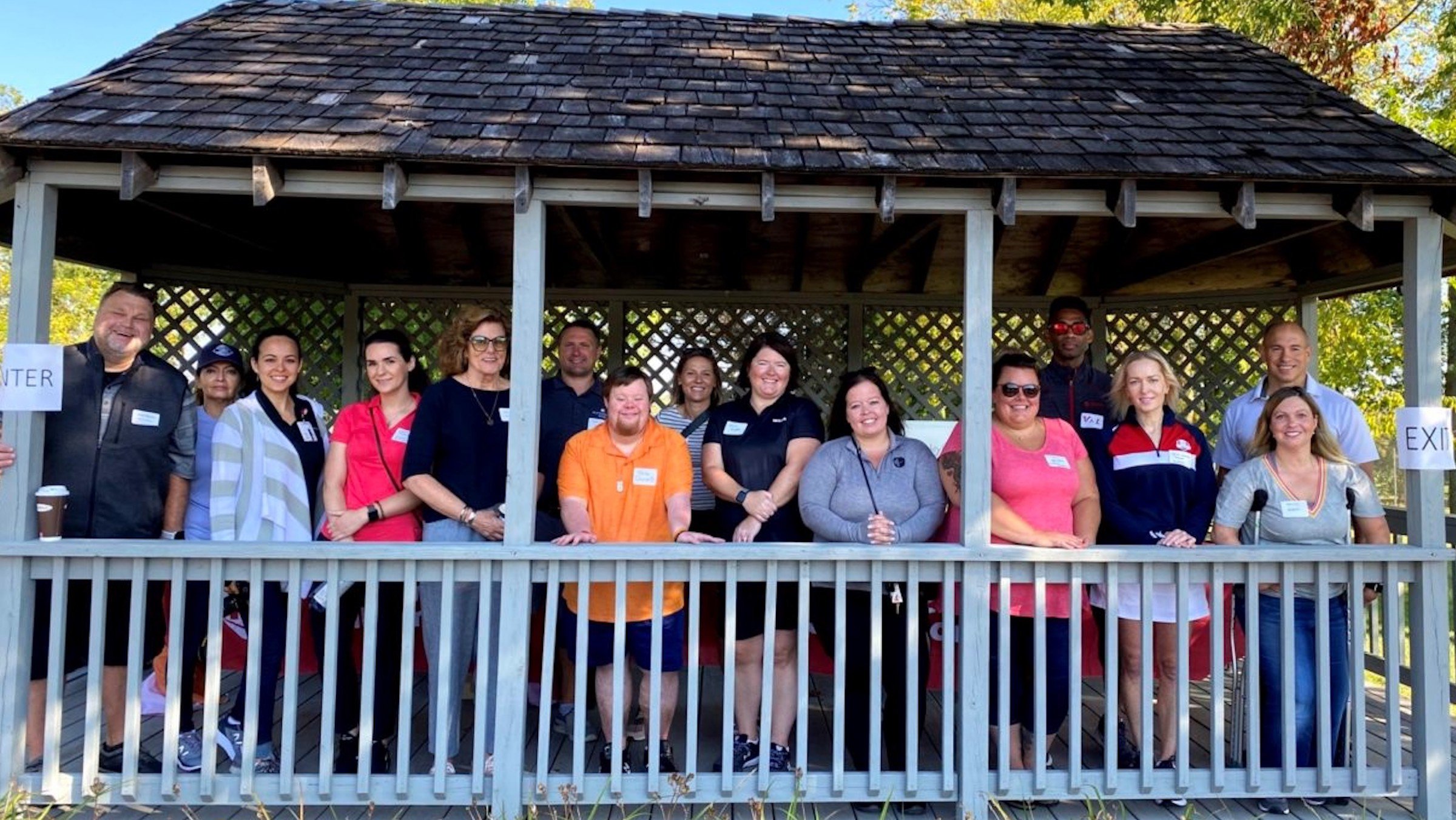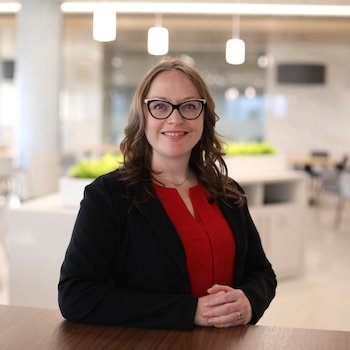When Jason Sprunk joined the ROKability employee resource group (ERG) at Rockwell Automation, he realized it was in need of a reinvigoration. Together with the leadership, a “re-brand” effort was completed for the group.
“We revised the mission statement, revised our logo, and began a push to drive awareness across the organization about disability in the workplace and the role this ERG plays at Rockwell Automation,” he says.
That was in 2019, and even with the giant curveball served up by the pandemic, ROKability has enjoyed major growth in the past two years.
“We went from a small list of names to 120 members as of today,” says Jason, Director of Global Revenue Management Systems Management and Operations and president of the ERG.
The ERG’s mission is to promote and celebrate awareness, achievement and victories of all abilities within Rockwell Automation and our community through shared information, organizational awareness, outreach, education and collaboration. The goal: to drive systemic changes within the enterprise and in our communities.
Change is never as fast as desired, but it is happening, Jason says.
"Success is beginning to show up through increased membership ranks and our growing impact on recruitment activities,” he says. “There's an effort that's been kicked off from within the organization to improve our talent acquisition of those with disabilities. And I think the ERG played a direct role in contributing to the awareness of this need.”
The pandemic and the increasingly competitive talent marketplace have illuminated the fact that Rockwell Automation should be seeking candidates with all sorts of abilities around the world.
Defining disability – and moving beyond definitions
According to the U.S. Centers for Disease Control and Prevention (CDC), a disability is “any condition of the body or mind (impairment) that makes it more difficult for the person with the condition to do certain activities (activity limitation) and interact with the world around them (participation restrictions). Therefore, people with disabilities make up a diverse and wide spectrum; in fact, one in four Americans have some type of disability. Disabilities can be caused by conditions (including autism and ADHD) and injuries that affect things like vision, hearing, movement, thinking, and remembering.
Per the Americans with Disabilities Act (ADA), which makes it illegal to discriminate against someone with a disability, a person with a disability is defined as someone who has a physical or mental impairment that limits one or more major life activity.
Despite the numbers, people with disabilities are much less likely to be employed than those without disabilities. Between 2019 and 2020, the employment rate for people with disabilities went down from 19.3% to 17.9%, according to the U.S. Bureau of Labor Statistics.
When it comes to the makeup of ROKability membership, disability status isn’t tracked.
“There’s an intentional approach to not want to pry or delve into the individual reasons why someone elects to become a member of this ERG,” Jason says. “We really have worked to not make the distinction of an ally versus something else, because everyone has their own story and their own reason for being interested in this topic.”
For Jason, a longtime employee who only recently became involved in the ERG, his interest came from caregiving that he was providing for his elderly, disabled parents. The caretaking was a huge focus of his life, yet he didn’t feel comfortable sharing that world with colleagues. While he has opened up and learned that other ROKability members are in similar caregiving situations, it’s important to him to approach disability conversations with sensitivity.
“From my perspective, making personal disability conversations the focus of membership eligibility introduces a level of restrictiveness that I think would preclude folks from being comfortable joining the ERG. We welcome members of all abilities to our ERG” he says.
Like Jason, ROKability member Rachel Schickowski had worked at Rockwell for many years before becoming involved in the ERG. Rachel, Employee Engagement Manager, was born with arthrogryposis multiplex congenita (AMC), a condition that limits joint movement, and in recent years has been more open about her disability.
“I was hesitant to be part of ROKability for my first 10 years at Rockwell because I didn't want a disability to be what I was about. I just wanted to do good work and have that be my reputation - not my disability,” she says. But as time went on, she realized she had a perspective and opinions that needed to be voiced, on topics like navigating the building and work travel.
“I wanted to help fix the things that are a struggle for me, because there’s going to be another Rachel down the road, dealing with the same things,” she says.
National Disability Employment Awareness Month
October is National Disability Employment Awareness Month in the U.S, providing an opportunity for ROKability to raise awareness about disability in the workplace and celebrate all types of difference.
“At any moment in time, any of us can become disabled – and that makes this ERG unique from many of the other employee resource groups at the company. It could potentially apply to anyone here,” Jason says. “I’d like employees to know where to turn for help, community support and advocacy should they ever need it.”
Not only is there a robust internal communications plan to highlight individual members of ROKability during NDEAM, but there will be a virtual panel discussion where employees with disabilities and those who are caretakers for family members who have disabilities will talk about their experiences at work and home.
Community outreach and activities are also a big part of the group’s mission. Jason recently led the planning of an inaugural golf outing in the Milwaukee area that helped raise money for local nonprofit partner organizations. The event exceeded expectations with over 175 golfers and charitable proceeds of nearly $30,000.
“It’s clear the Milwaukee region has interest in supporting and growing the awareness of the need for disability inclusion,” Jason says.
Another thing to highlight during NDEAM is ROKability’s influence on recruitment and hiring – which has the potential to make a big difference, Jason says. Targeting candidates with disabilities for recruitment and hiring will show that the company is interested in becoming a more inclusive place for them, and a place they can stay and grow their careers.
“We want Rockwell Automation to be successful in acquiring talent that includes those with physical or neuro disabilities,” says Jason, who is a hiring manager. “That led me to get involved and try to create a more vibrant community around those of us who either have disabilities or support or care for those with disabilities, and also focus on improving our recruitment and retention of people with disabilities.”
He is confident that the research and collaboration that has been taking place in recent months primes Rockwell Automation for wins on the recruitment front in the next fiscal year.
“We know that folks with disabilities are looking for employment – and we want them to find it with us, where they feel safe and empowered to be themselves,” Jason says.
Rockwell Automation is known for its commitment to diversity, equity and inclusion, and attracting and retaining people with disabilities is a piece of that equation.
“Often the first things that come to mind when you talk about inclusion and diversity are gender and race, but that includes people with disabilities, too,” Rachel says. “It’s easy to forget about, especially because some disabilities are hidden, but that’s what I like about ROKability. We can help keep all disabilities in the larger conversation.”


